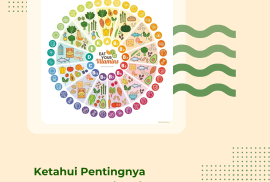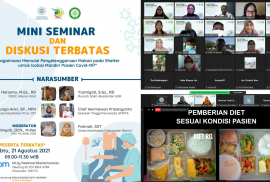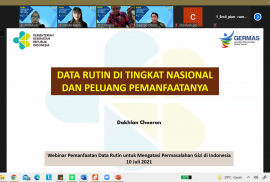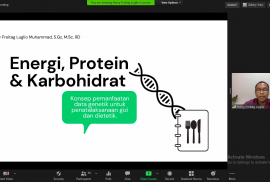Nowadays, the rapid development of science and technology is felt in various sectors, including nutrition and health. The concept of a medical paradigm through a predictive, preventive, personal, and participatory approach can manage and support a specific health status for individuals. Personalized nutrition is a basic concept that shows everyone has a different metabolism, genetics, biochemistry, and microbiota that contribute to the body’s response to nutritional intake. Therefore, the concept of personalized nutrition applies multidisciplinary, such as nutrition, medicine, biology, epigenetics, and genomics to demonstrate the relationship of individual variation to a disease risk.
Nutrigenetics and nutrigenomics play an important role in genetically based nutrition recommendations or personalized nutrition. Individuals have different genetic variations that can affect the body’s response to nutrients. Nutrigenetics describes the interaction of genetic variation with the environment, including the nutrients contained in food. While nutrigenomics consider the impact of nutrient intake (macronutrients, micronutrients, and bioactives) on gene expression, where nutrients can activate or silence certain genes. Thus, nutrigenetics plays a role in providing an overview of the individual’s response to the environment and nutrigenomics will provide appropriate dietary recommendations.
One example of the application of nutrigenetic to describe the interaction of genes and nutrients is the activity of methylene-tetra-hydro folate reductase (MTHFR) enzyme. MTHFR enzyme involved in folic acid metabolism and maintenance of homocysteine levels. A particular MTHFR gene SNP (C677T and A 1298C) were associated with an increase in blood homocysteine levels, especially in conditions of deficiency folic acid intake. In addition, individuals with low MTHFR enzyme activity are usually accompanied by elevated homocysteine levels, which have been associated with inflammation and heart disease, difficulty conceiving, birth defects, and potentially impaired detoxification abilities. For this reason, intake of micronutrients including folic acid, vitamin B6, and B12 is very important to maintain homocysteine levels.
Based on nutrigenomics, an example of nutritional intake that affects gene expression can be known through phenylketonuria disease. Phenylketonuria or PKU is an inherited metabolic disorder caused by mutations in a single gene, thus patients should avoid foods containing the amino acid phenylalanine. High levels of phenylalanine in the body can interfere with brain function, mental retardation, and seizures.
Currently, research in nutrigenetics and nutrigenomics related to the prevention and treatment of diseases is increasing, including chronic diseases such as obesity, type 2 diabetes mellitus, cancer, and cardiovascular disease. Personalized nutrition is certainly useful for a nutritionist or dietitian in providing appropriate nutritional recommendations according to the genetic characteristics of individuals. By knowing the role of nutrigenetics and nutrigenomics in personalizing nutrition, hoped this knowledge will develop as the basic concept to provide nutritional recommendations.
Archibald, A. and Joffe, Y., 2021. The Role of Nutrigenetics and Nutrigenomics in Clinical Nutrition Practice. ADCES in Practice, 9(2), pp.34-40.
Bush, C.L., Blumberg, J.B., El-Sohemy, A., Minich, D.M., Ordovás, J.M., Reed, D.G. and Behm, V.A.Y., 2020. Toward the definition of personalized nutrition: a proposal by the American Nutrition Association. Journal of the American College of Nutrition, 39(1), pp.5-15.
Di Renzo, L., Gualtieri, P., Romano, L., Marrone, G., Noce, A., Pujia, A., Perrone, M.A., Aiello, V., Colica, C. and De Lorenzo, A., 2019. Role of personalized nutrition in chronic-degenerative diseases. Nutrients, 11(8), p.1707.
Marcum, J.A., 2020. Nutrigenetics/nutrigenomics, personalized nutrition, and precision healthcare. Current nutrition reports, 9(4), pp.338-345.
Sharma, P. and Dwivedi, S., 2017. Nutrigenomics and nutrigenetics: new insight in disease prevention and cure. Indian Journal of Clinical Biochemistry, 32(4), pp.371-373.
Uthpala, T.G.G., Fernando, H.N., Thibbotuwawa, A. and Jayasinghe, M., 2020. Importance of nutrigenomics and nutrigenetics in food Science. MOJ Food Processing & Technology, 8(3), pp.114-119.










